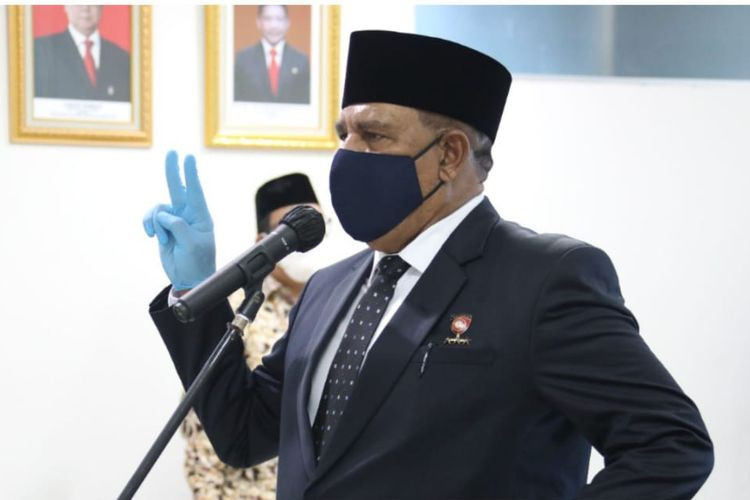Popular Reads
Top Results
Can't find what you're looking for?
View all search resultsPopular Reads
Top Results
Can't find what you're looking for?
View all search resultsObservers decry lack of transparency in interim leader selection
The Home Ministry has gone ahead and installed five acting governors, even as observers and critics have pointed to a process that has neglected transparency and public participation.
Change text size
Gift Premium Articles
to Anyone
I
gnoring cries for transparency, the government has pushed through a plan to appoint acting regional heads from a pool of high-ranking state officials on Thursday, starting a process to replace 271 outgoing regional heads prior to the 2024 regional elections.
Home Minister Tito Karnavian inaugurated on Thursday five senior officials as acting governors: the energy ministry's minerals and coal director general Ridwan Djamaluddin as the acting governor of the Bangka Belitung Islands, Banten administrative secretary Al Muktabar as the Banten acting governor, expert staffer to the sports minister Hamka Hendra Noer as the Gorontalo acting governor and Home Ministry deputy and former West Papua Police chief Paulus Waterpauw as the acting governor of West Papua.
A total of 101 regional leadership posts are becoming vacant this year, including the Jakarta governorship, while 154 mayoralties and regency posts and 17 governorships are becoming vacant in 2023, including leadership posts in the most populous provinces of West, East and Central Java.
Transparency needed
Critics have repeatedly called for a more open and transparent selection process that would allow the public to monitor and give their feedback on the candidates, particularly after their closed-door nominations by regional administrations.
Read also: Despite critics, govt pushes forward with acting regional head appointment
In addition, the Constitutional Court said in its opinion, issued in late April as part of a ruling on appointing acting regional heads, the government needed to consider devising regulations with "measurable and clear mechanisms” to ensure adherence to democratic principles.
Thursday’s inauguration proceeded without the government heeding these calls, but Tito said in a press statement on Thursday that the process was in line with the prevailing laws and regulations, specifically the 2016 Regional Elections Law.
The law authorizes the government to unilaterally appoint national and provincial echelon I officials, such as directors generals and administrative secretaries, as interim leaders until the regional heads are elected in 2024.
Tito also insisted that democratic principles and transparency were applied during the candidates’ vetting process and final assessment.
The assessment team is headed by President Joko "Jokowi" Widodo and includes certain Cabinet ministers, although the President has the final say in approving a candidate.
Read also: Concerns emerge over possible appointment of TNI, police leaders as acting regional heads
Tito claimed that the assessment discussed each individual candidate and their performance, adding that “everything was discussed there".
Mounting concerns
The government's decision to move forward and appoint the interim leaders without a more detailed selection mechanism has raised concerns among expert observers, who said such a regulation would quell any suspicions over underlying motives behind the appointments.
Titi Anggraini from election watchdog Association for Elections and Democracy (Perludem) urged the Home Ministry to follow the court's ruling to draw up more detailed regulations before appointing other interim leaders, as doing so would provide greater legitimacy and help maintain public trust.
“Since the Home Minister has said that the process has been democratic, he just needs to formalize the mechanism through an official regulation,” Titi said on Tuesday.
“In fact, it is the government’s unwillingness to issue such a regulation that raises suspicion and controversy, that there is a hidden agenda behind the appointment of the interim leaders.”
Constitutional law expert Feri Amsari slammed the government’s move: “Every policy and action taken by the government should have parameters, one of them being the court decision. If the government does not follow through, then the policy needs to be considered as arbitrary.”
He added that issuing a more detailed regulation “should not be difficult, but the intention is just not there”.
“That’s why the Home Ministry is not willing to make these regulations, since it would restrict their choices in selecting interim leaders.”
Indonesian Democratic Party of Struggle (PDI-P) lawmaker Junimart Girsang, a member of House of Representatives Commission II overseeing home affairs, said that while the authority to appoint acting regional heads remained with the government, Commission II would also supervise the future selection process.
"We will focus on supervising the Home Ministry in selecting the interim leaders. […] We will see if [the candidates are] fit for the job, including in terms of their civil servant rankings. We will also look at their track record,” Junimart said.










